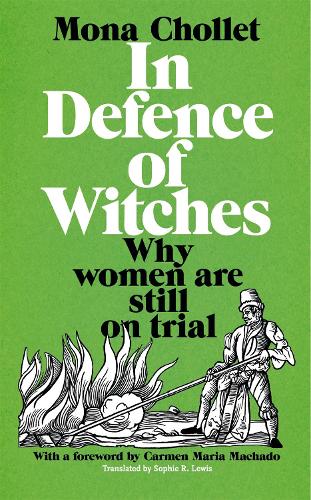
In Defence of Witches: Why women are still on trial
(Paperback)
Available Formats
Publishing Details
In Defence of Witches: Why women are still on trial
By (Author) Mona Chollet
Translated by Sophie R Lewis
Pan Macmillan
Picador
6th January 2022
United Kingdom
Classifications
General
Non Fiction
305.42
Physical Properties
Paperback
304
Width 153mm, Height 234mm
Description
What remains of the witch hunts A stubborn misogyny, which still tints the way our societies look at single women, childless women, aging women, or quite simply, free women . . . Today more than ever, witches tell us about our world and lead the way.' - Tlrama A source of terror, a misogynistic image of woman inherited from the trials and the pyres of the great early modern witch hunts - in In Defence of Witches the witch is recast as a powerful role model to women today: an emblem of power, free to exist beyond the narrow limits society imposes on women. Whether selling grimoires on Etsy, posting photos of their crystal-adorned altar on Instagram, or gathering to cast spells on Donald Trump, witches are everywhere. But who exactly were the forebears of these modern witches Who was historically accused of witchcraft, often meeting violent ends What types of women have been censored, eliminated, repressed, over the centuries Mona Chollet takes three archetypes from historic witch hunts, and examines how far women today have the same charges levelled against them: independent women; women who choose not to have children; and women who reject the idea that to age is a terrible thing. Finally, Chollet argues that by considering the lives of those who dared to live differently, we can learn more about the richness of roles available, just how many different things a woman can choose to be.
Reviews
A thought-provoking, discursive survey by Mona Chollet, a bright light of Francophone feminism . . . Chollet has emerged as a quiet revolutionary, pushing back against the clichs and the patriarchy that shapes them. -- Rachel Donadio * The New York Times *
What sets Chollets book apart is her aligning so clearly the historical mistreatment of so-called witches with the misogyny of the 21st century. The subtitle sums it up: why women are still on trial . . . a rousing read. -- Sarah Gilmartin * Irish Times *
Explores the worldview that the witch hunt has sought to promote - and its consequences on society today * Vice *
Mona Chollet reminds us how an infamous label has become a symbol of women's resistance to male domination. * Le Monde *
[Mona Chollet] rehabilitates the figure of the witch, this dangerously independent, educated and strong woman. * Slate *
[Mona Chollet] dissects this figure from our history and our imagination and demonstrates how women today, those who free themselves from certain social norms, are in fact the direct heirs of those who were pursued, hunted, censored, eliminated during the Renaissance. * Huffington Post *
The term witches is still used today to caricature women of power, aging women or quite simply free women . . . Mona Chollet wonders about what remains today of the great witch hunts, that is to say the massacre of tens of thousands of women in Europe between the 16th and 17th centuries . . . [She] ends up convincing: the witch is a figure more fascinating and empowering than repulsive. * Libration *
What remains of the witch hunts A stubborn misogyny, which still tints the way our societies look at single women, childless women, aging women, or quite simply, free women . . . Today more than ever, witches tell us about our world and lead the way. * Tlrama *
A smart feminist treatise reclaiming the witch and her radical way of life as a path forward for womem . . . Chollets informed and passionate treatment will appeal to readers looking for more substance amid the witch trend thats otherwise been largely commodified and often scrubbed of its feminist origins * Booklist *
Author Bio
Mona Chollet is a journalist for le Monde Diplomatique and speaks fluent English. In 2017 she appeared at the Festival Albertine in New York (curated by Gloria Steinem), on a panel with Roxane Gay (to talk about women's bodies and their treatment as public property). She has written on women's bodies, the domestic sphere and dismantling right-wing political imagery.
